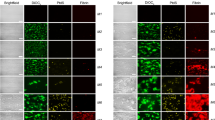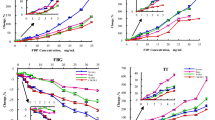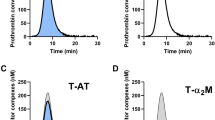Abstract
THE data presented in this communication demonstrate that the degradation of adenosine triphosphate (ATP) in whole blood, initiated by the damaged wall of a blood vessel, can only take place in conjunction with activation of the coagulation mechanisms.
This is a preview of subscription content, access via your institution
Access options
Subscribe to this journal
Receive 51 print issues and online access
$199.00 per year
only $3.90 per issue
Buy this article
- Purchase on Springer Link
- Instant access to full article PDF
Prices may be subject to local taxes which are calculated during checkout
Similar content being viewed by others
References
Bettex-Galland, M., and Lüscher, E. F., Thromb. Diathes. Haem., 4, 178 (1960).
Haslam, R. J., Nature, 202, 765 (1964).
Spaet, T. H., and Zucker, M. B., Amer. J. Physiol., 206, 1267 (1964).
Marr, J., Barboriak, J. J., and Johnson, S. A., Nature, 205, 259 (1965).
Honour, A. J., and Mitchell, J. R. A., Brit. J. Exp. Path., 55, 75 (1964).
Randerath, K., Verlag Chemie (Academic Press, New York, 1963).
Author information
Authors and Affiliations
Rights and permissions
About this article
Cite this article
MARR, J., TEBO, T. & JOHNSON, S. Importance of the Mechanisms of Blood Coagulation in the Breakdown of Adenosine Triphosphate in Blood. Nature 211, 1306–1308 (1966). https://doi.org/10.1038/2111306a0
Issue Date:
DOI: https://doi.org/10.1038/2111306a0
Comments
By submitting a comment you agree to abide by our Terms and Community Guidelines. If you find something abusive or that does not comply with our terms or guidelines please flag it as inappropriate.



